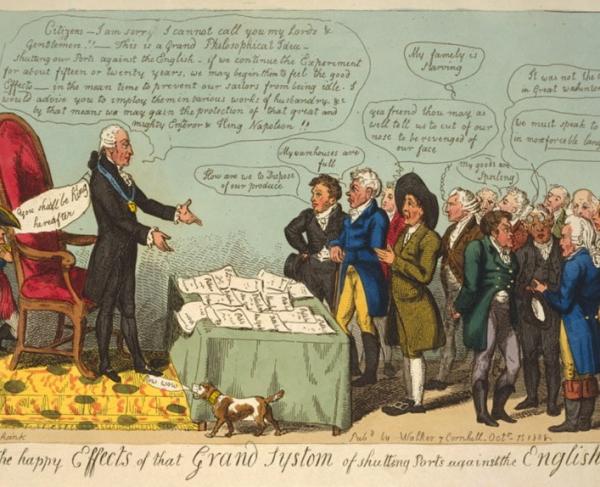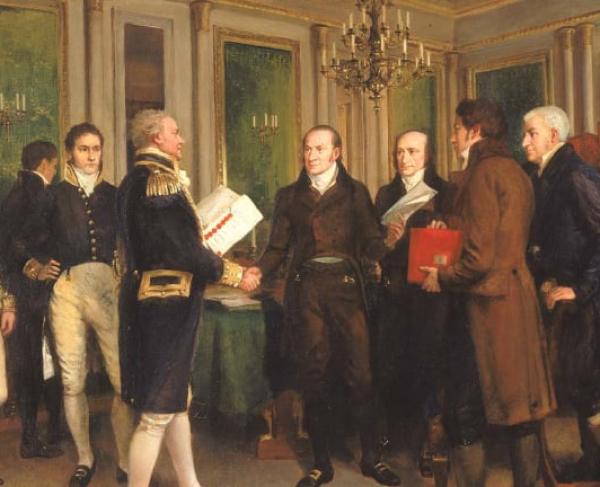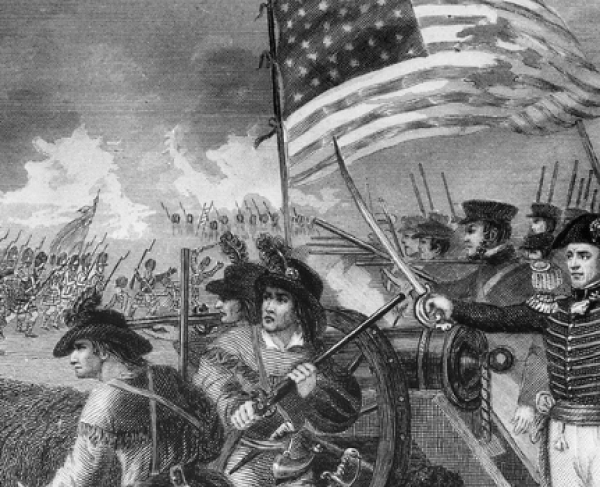Federalists, War Hawks & The War of 1812
In the years leading up to the War of 1812, the United States experienced high levels of partisanship and political discord, especially regarding foreign policy. Those who favored a more aggressive foreign policy, mainly members of the Democratic-Republican Party, became known as “War Hawks.” They were opposed by members of the Federalist Party, who wanted to avoid war with Britain at almost any cost.
The wars which had disturbed Europe since the French Revolution placed the United States in a dangerous but potentially lucrative position. The French and the British could both profit tremendously from America’s natural resources and markets for manufactured goods. Since Jay’s Treaty was ratified in 1796, trade between the United States and Great Britain had blossomed. On the other hand, French resentment of this trade and the need to disrupt British commerce led to the undeclared Quasi-War, in which French privateers attacked American ships. Negotiations between French and American diplomats at the Convention of 1800 successfully ended the French attacks on shipping, but American commerce continued to be threatened by France and Britain alike. Britain in particular was insistent on her traditional maritime rights—including the impressment of sailors—which Americans viewed as a violation of international law.
America’s first party system developed during these tense years; domestic politics, too, was chaotic while the young nation learned how to govern itself. The Federalist Party first emerged as the defender of the Constitution in the late 1780s. The party enjoyed early success and held the presidency under George Washington and John Adams. Domestically, it favored a strong national government and an internal improvement scheme. When facing the growing conflict in Europe, Federalists tended to favor Britain and fear France’s revolutionary influence. Although Federalists were found across the country, they were strongest in New England, where the economy was most dependent on trade with Britain.
The Federalists lost power in 1800 with the election of Thomas Jefferson to the presidency. Adams had been an unpopular president, and the Federalists were especially criticized for the Alien and Sedition Acts. The Democratic-Republican Party, founded by Jefferson himself, became increasingly powerful in turn. Democratic-Republicans favored decentralization and were far more sympathetic to the French Revolution. They often accused the Federalists of elitism and favoring monarchy, while Federalists accused Democratic-Republicans of demagoguery.
Partisanship only increased as war grew closer. Both France and Britain viewed the Napoleonic wars as an existential struggle, and the British government assumed that their traditional maritime rights were necessary to retain naval dominance. This led to a series of incidents straining relations between Britain and the United States, alarming Federalists and Democratic-Republicans alike. Britain targeted American ships carrying goods between French ports and the ports of her allies and impressed sailors into the Royal Navy. In 1807, a British vessel attacked and boarded the USS Chesapeake while looking for deserters. At the end of the same year, Congress enacted an embargo suspending all international trade.
The Embargo Act of 1807 was favored by some Democratic-Republicans as a peaceful way of pressuring Britain and France into resuming free trade. Jefferson in particular had faith in the power of economic warfare, while many Federalists were more skeptical and sought compromise instead. They were frustrated by the failure of the Monroe-Pinkney Treaty, a failed attempt to settle maritime disputes which did not resolve the issue of impressment and so was not sent by Jefferson to Congress for ratification. The term “War Hawk” began to be used, mostly by Federalists newspapers, to describe pro-war politicians.
War Hawks were concerned not just with the practical consequences of British aggression but also with a sense of national honor. They felt that Britain failed to acknowledge American sovereignty and that another victorious war would serve as a second war of independence. Some also felt threatened both by Canada’s existence and Britain’s support for Native American nations in conflicts with Native American settlers; war with Britain seemed necessary to continue westward expansion. Support for war was therefore strong in western frontier states and territories, where Democratic-Republicans already held more support. Not all Democratic-Republicans were War Hawks, though, and both Jefferson and his successor James Madison made sincere efforts to avoid war.
The most prominent War Hawks were Henry Clay and John C. Calhoun. Both were young men relatively early in their careers. Clay would go on to become the “Great Compromiser” and work his whole life to preserve national union; Calhoun, in contrast, would become a stout defender of sectionalism, the South and slavery. As the leaders of the War Hawks faction, though, both were strong nationalists determined to protect American honor. This reflected growing pro-war sentiments across the country and in Congress; Clay was made Speaker of the House in 1811.
The Embargo Act seriously damaged the American economy and led to a resurgence of Federalist popularity, especially in New England. Federalists were, as a rule, more concerned with maintaining a positive trade relationship with Britain than national honor. They resented any suggestions of invading Canada as attacks on an innocent country. Major anti-war Federalists included Josiah Quincy and Daniel Webster, who would become a close political ally of Clay’s a decade later. Some major Democratic-Republicans like John Randolph of Virginia also strongly opposed declaring war.
Late in 1811 the Battle of Tippecanoe, fought against the British-allied Native American coalition, further increased tensions. Despite ongoing diplomatic negotiations, Britain failed to repeal the Orders in Council, a series of decrees blockading Europe and subjecting American ships to seizure if they violated the orders. Finally, on June 18, 1812, Congress voted to declare war and the War of 1812 officially began. Not a single Federalist voted for war.
However, once war began, many Federalists rallied to the cause for national unity. Volunteers came from all over the young country, including the heart of New England. At the same time, the war was highly unpopular in the areas most dependent on British trade; unhappy Federalists called it “Mr. Madison’s War.” Some historians likened the rancor over the War of 1812 to that over the Vietnam War, a century and a half later. It even threatened the survival of national union: the island of Nantucket declared its neutrality, while Massachusetts’ Governor Caleb Strong attempted negotiations for a separate peace. Most damaging to the Federalists’ reputation was the infamous Hartford Convention, at which some Federalist delegates considered New England’s secession.
When news of peace and the victory at New Orleans reached the American public—often at the same time—much of the war’s previous unpopularity was forgotten. The remaining Federalists faded into political obscurity while the Democratic-Republicans shaped national policy for the following decade. The success of the Treaty of Ghent and Andrew Jackson’s victory at the Battle of New Orleans meant that the United States enjoyed a surge in nationalism with the end of the War of 1812, and the country soon entered a period of political unity known as the “Era of Good Feelings.”



